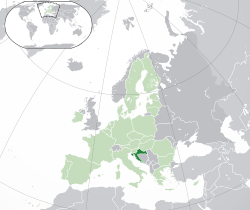
Croatia
Country in Southeast Europe / From Wikipedia, the free encyclopedia
Dear Wikiwand AI, let's keep it short by simply answering these key questions:
Can you list the top facts and stats about Croatia?
Summarize this article for a 10 years old
Croatia (/kroʊˈeɪʃə/ ⓘ, kroh-AY-shə; Croatian: Hrvatska, pronounced [xř̩ʋaːtskaː]), officially the Republic of Croatia (Croatian: Republika Hrvatska, (listenⓘ)),[lower-alpha 4] is a country located at the crossroads of Central and Southeast Europe. Its coast lies entirely on the Adriatic Sea. It borders Slovenia to the northwest, Hungary to the northeast, Serbia to the east, Bosnia and Herzegovina and Montenegro to the southeast, and shares a maritime border with Italy to the west and southwest. Its capital and largest city, Zagreb, forms one of the country's primary subdivisions, with twenty counties. The country spans 56,594 square kilometres (21,851 square miles), and has a population of nearly 3.9 million.
Republic of Croatia | |
|---|---|
| Anthem: "Lijepa naša domovino" ("Our Beautiful Homeland") | |
| Capital and largest city | Zagreb 45°48′47″N 15°58′39″E |
| Official languages | Croatian[lower-alpha 2] |
| Writing system | Latin[lower-alpha 3] |
| Ethnic groups (2021) | |
| Religion (2021) |
|
| Demonym(s) | |
| Government | Unitary parliamentary republic |
| Zoran Milanović | |
| Andrej Plenković | |
| Gordan Jandroković | |
| Legislature | Sabor |
| Establishment history | |
• Duchy | 7th century |
• Kingdom | 925 |
| 1102 | |
• Joined Habsburg Monarchy | 1 January 1527 |
| 29 October 1918 | |
| 4 December 1918 | |
| 25 June 1991[5] | |
| 22 May 1992 | |
| 12 November 1995 | |
| 1 April 2009 | |
| 1 July 2013 | |
| Area | |
• Total | 56,594 km2 (21,851 sq mi) (124th) |
• Water (%) | 1.09 |
| Population | |
• 2021 census | |
• Density | 68.4/km2 (177.2/sq mi) (152nd) |
| GDP (PPP) | 2023 estimate |
• Total | |
• Per capita | |
| GDP (nominal) | 2023 estimate |
• Total | |
• Per capita | |
| Gini (2020) | low |
| HDI (2021) | very high · 40th |
| Currency | Euro (€) (EUR) |
| Time zone | UTC+1 (CET) |
| UTC+2 (CEST) | |
| Date format | dd. mm. yyyy. (CE) |
| Driving side | right |
| Calling code | +385 |
| ISO 3166 code | HR |
| Internet TLD | |
The Croats arrived in modern-day Croatia in the late 6th century, then part of Roman Illyria. By the 7th century, they had organized the territory into two duchies. Croatia was first internationally recognized as independent on 7 June 879 during the reign of Duke Branimir. Tomislav became the first king by 925, elevating Croatia to the status of a kingdom. During the succession crisis after the Trpimirović dynasty ended, Croatia entered a personal union with Hungary in 1102. In 1527, faced with Ottoman conquest, the Croatian Parliament elected Ferdinand I of Austria to the Croatian throne. In October 1918, the State of Slovenes, Croats, and Serbs, independent from Austria-Hungary, was proclaimed in Zagreb, and in December 1918, it merged into the Kingdom of Yugoslavia. Following the Axis invasion of Yugoslavia in April 1941, most of Croatia was incorporated into a Nazi-installed puppet state, the Independent State of Croatia. A resistance movement led to the creation of the Socialist Republic of Croatia, which after the war became a founding member and constituent of the Socialist Federal Republic of Yugoslavia. On 25 June 1991, Croatia declared independence, and the War of Independence was successfully fought over the next four years.
Croatia is a republic and a parliamentary liberal democracy. It is a member of the European Union, the Eurozone, the Schengen Area, NATO, the United Nations, the Council of Europe, the OSCE, the World Trade Organization, a founding member of the Union for the Mediterranean, and is currently in the process of joining the OECD. An active participant in United Nations peacekeeping, Croatia contributed troops to the International Security Assistance Force and was elected to fill a non-permanent seat on the United Nations Security Council in the 2008–2009 term for the first time.
Croatia is a developed country with an advanced high-income economy and ranks 40th in the Human Development Index.[10][11] According to the Gini coefficient, it also ranks among the top 20 countries with the lowest income inequality in the world. Service, industrial sectors, and agriculture dominate the economy. Tourism is a significant source of revenue for the country, which is ranked among the top 20 most popular tourist destinations in the world.[12][13] Since 2000s, the Croatian government has heavily invested in infrastructure, especially transport routes and facilities along the Pan-European corridors. Croatia has also positioned itself as a regional energy leader in the early 2020s and is contributing to the diversification of Europe's energy supply via its floating liquefied natural gas import terminal off Krk island, LNG Hrvatska.[14] Croatia provides social security, universal health care, and tuition-free primary and secondary education while supporting culture through public institutions and corporate investments in media and publishing.


.png/220px-EU-Croatia_(orthographic_projection).png)
